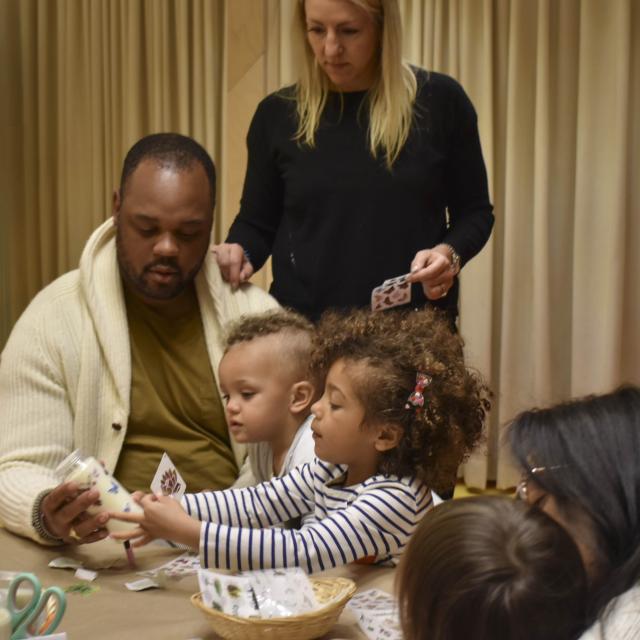High Conflict / Healthy Conflict

Bestselling author and trained conflict mediator Amanda Ripley shares insights on how to fight with dignity for the causes we care about most.
Conflict can be healthy. It can even be good; the kind of “good trouble” celebrated civil rights leader John Lewis reminded us can disrupt systems of injustice and create meaningful change. But when conflict escalates without rhyme or reason, when it reduces the people on the other side to caricatures and strips them of their humanity — that kind of conflict can become all-consuming, debilitating, and even counterproductive.
Journalist Amanda Ripley has spent years studying this phenomenon, which she calls “high conflict.” During the 2016 U.S. presidential election, she watched as Americans began to demonize one another based on political affinities.
Her conclusion? High conflict holds our country in its grip. But Ripley believes there’s a way out.
On October 27, Ripley will join Trinity Talks to discuss her book High Conflict: Why We Get Trapped and How We Get Out which follows people who managed to free themselves from destructive feuds.
The people in Ripley’s book – from a novice politician in California, an environmental activist in the U.K., to a guerrilla fighter in Colombia – were able to turn high conflict into healthy conflict, rehumanizing their opponents even as they continued to fight for what they believed in.
Ripley discovered a pattern in these transformations. She found that the only way to break out of escalating cycles of discord is to do something counterintuitive. That means resisting false binaries that oversimplify complicated issues. It means recognizing the conflict accelerators who profit from these binaries (more on that later). And it’s about taking deliberate steps to understand the other side, even when we disagree with their stances.
For Ripley, the key is not to fight less but to fight smart.
What exactly is high conflict? And what’s the difference between high conflict and healthy conflict?
High conflict is what happens when conflict escalates to a point where it takes on a life of its own. In this state, we behave differently. We make more mistakes. We lose our peripheral vision — literally and figuratively. It becomes conflict for conflict's sake. And the worst part is, people in high conflict end up harming the thing they care most about, whether it’s their family or their country.
So I think the challenge of our time is how do we shift out of high conflict and into what might be called “good conflict?” Or healthy conflict?
Good conflict still involves friction and discord, even anger. But when people are in good conflict, they tend to ask each other more questions. They experience a range of emotions, from anger to frustration to confusion to flashes of curiosity or even humor. You can really see the difference when you observe this conflict — and you can feel it, when you are in it.
Does avoiding high conflict mean having to surrender your own beliefs?
No. If you surrender your beliefs, that's not good conflict. That's avoidance. It just buries the conflict. And it can roar back to life in some dysfunctional way later.
Gary Friedman, a conflict expert I followed for the book, doesn't even use the word "compromise" when he mediates conflicts — even really ugly divorces or labor disputes. He's taught me to focus less on agreement and more on understanding. Let's figure out what we're really fighting about — what we really need to fight about — and what we can let go.
Good conflict is not about unity, harmony, or surrender. It’s about standing up for what you believe in, with curiosity, without contempt. It’s much more effective, and it’s just better for the soul.
Good conflict is not about unity, harmony, or surrender. It’s about standing up for what you believe in, with curiosity, without contempt."
What are some factors that can accelerate high conflict?
I spent several years following people who were stuck in seemingly irreconcilable clashes, and in every case, four components were always present to different degrees. I've come to think of these four things as tripwires — they can spark high conflict, even when the original dispute seems small: humiliation, corruption, false dichotomies (us-versus-them thinking), and conflict entrepreneurs (people or companies that exploit and inflame conflict for their own ends). Often, these elements will interact. Conflict entrepreneurs will frame lots of perceived or real slights as disrespectful or humiliating, for example. They engage in a lot of us-versus-them, good-versus-evil rhetoric. They see corruption everywhere, whether it exists or not.
Right now, we’re in the middle of a heated election season, where each side treats the other as an existential threat to our country. What can we do to prepare for November 5 and its fallout?
I've learned that resisting high conflict starts in your own head. You can't control other people, but you can try to stay in good conflict in your own mind. If you can do this, you'll make fewer mistakes — and be more capable of helping other people get out of high conflict, too.
So what does that look like? Well, the first step for most people I've followed is to distance themselves from the conflict entrepreneurs in their lives (or their media feeds).
In the case of Curtis Toler, the former gang leader I wrote about, he literally moved to a new apartment in Chicago. So people couldn’t find him — and he didn’t know all the details of who did what and who should pay for each new affront.
With the novice politician I followed, he stopped relying on a seasoned political operative for advice. He started asking his wife, instead. She was the opposite of a conflict entrepreneur. She saw people as whole, complicated humans. And, importantly, he stopped acting as a conflict entrepreneur himself. This is big. There are a lot of incentives right now for conflict entrepreneurs, so ... the first rule is to try not to be one!
One of the most painful aspects of our polarized society is how it has caused divisions within families. How can we avoid high conflict while discussing hot topics with loved ones with opposing beliefs?
Yes, it's really heartbreaking to see how we are turning on one another. We're being manipulated by conflict entrepreneurs and playing right into their hands, in a lot of cases.
So what to do about this? Please stop trying to convince your family members that they are wrong and you are right. That doesn't work — I wish it did! Changing people's minds takes a very long time, and it has to feel like their idea. If you force it, you will make them double down on their beliefs.
Instead of trying to change people, change your goal. What if you try to learn one thing about how this person came to have these beliefs? Did they always think like this? What changed? What’s driving them to hold onto this belief, regardless of how wrong you think they are? Getting to that understanding would be a really significant achievement in this kind of conflict. But it's not easy to do without practice.
To hear more, please register to join us for Trinity Talks on October 27.
Amanda Ripley is the co-founder of Good Conflict, a media and training company that helps people reimagine how to respond to discord.
Photographer: Lynn Savarese






